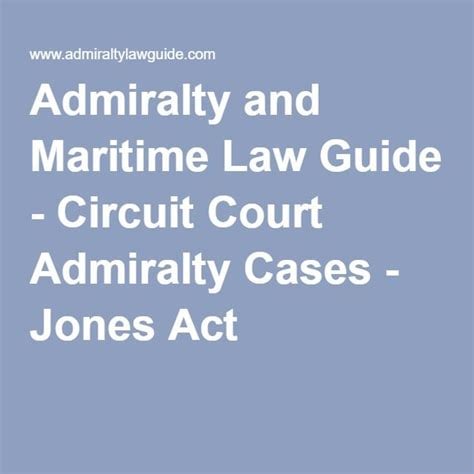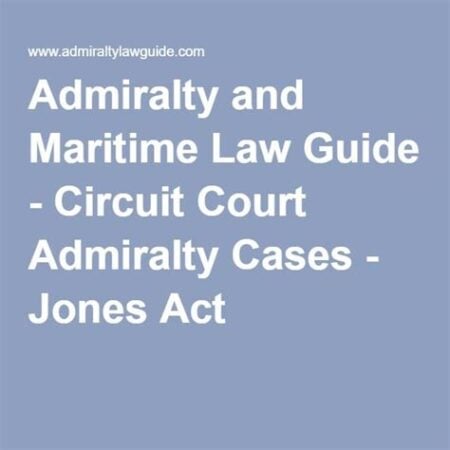
- Maritime Law: A Guide to Court Cases and Legal Disputes
-
FAQ about Maritime Law Court Cases
- What is maritime law?
- What types of maritime cases are handled in court?
- Who can file a maritime lawsuit?
- What are the common defenses in maritime cases?
- What is the difference between a general maritime law case and an admiralty case?
- What is the role of an admiralty court?
- What are the limitations on maritime lawsuits?
- What is the role of a maritime attorney?
- What are the potential penalties for maritime violations?
- How can I prevent maritime legal disputes?
Maritime Law: A Guide to Court Cases and Legal Disputes

Overview of Maritime Law
Maritime law, also known as admiralty law, is a specialized area of law that governs activities conducted on or relating to waterways, including oceans, seas, and rivers. This intricate legal framework encompasses a wide range of matters, from collisions and salvage to environmental protection and shipping contracts. Understanding the intricacies of maritime law is essential for individuals and businesses engaged in maritime pursuits, as it provides guidance on legal rights, responsibilities, and dispute resolution mechanisms.
Maritime law has a long and rich history, dating back to ancient civilizations that relied on maritime trade and transportation. Over centuries, maritime laws have evolved to address the unique challenges and complexities of maritime activities, creating a distinct body of legal principles and precedents. Today, maritime law plays a vital role in regulating global shipping, protecting marine resources, and ensuring the safety and well-being of those engaged in maritime ventures.
Types of Maritime Law Court Cases
Maritime law covers a broad spectrum of legal issues arising from maritime activities. Some of the most common types of maritime law court cases include:
Collisions and Accidents
Collisions between vessels or between a vessel and a fixed object, such as a dock or bridge, are a primary source of maritime disputes. These cases often involve complex issues of negligence, fault, and liability. Legal professionals analyze evidence to determine the cause of the collision and apportion responsibility among the parties involved.
Salvage and Wreck Removal
Salvage operations involve the recovery of vessels or cargo that have been damaged or sunk in navigable waters. Maritime law governs the rights and obligations of salvors who undertake these operations, as well as the distribution of salvage awards. Similarly, maritime courts adjudicate cases related to the removal of wrecks and obstructions from waterways.
Cargo Disputes
Disputes over the carriage of goods by sea are another common type of maritime law case. Breaches of contract, damage to cargo, and disputes over freight payments can result in legal proceedings. Maritime law establishes legal frameworks for resolving these disputes and determining liability.
Environmental Protection
Maritime law plays a crucial role in safeguarding marine ecosystems and protecting coastal areas. Court cases involving pollution, oil spills, and the illegal discharge of waste are frequently handled within the maritime legal system. Maritime courts enforce environmental regulations and impose penalties for violations.
Maritime Contracts
Contracts related to the chartering of vessels, the sale and purchase of ships, and marine insurance are subject to maritime law. Legal disputes arising from these contracts are adjudicated in maritime courts, which apply specialized legal principles and industry practices to resolve contractual disputes.
Admiralty and Jurisdiction
Maritime law cases are typically heard in admiralty courts, which are specialized courts that handle maritime disputes. Admiralty courts exercise jurisdiction over matters occurring on navigable waters and apply the principles of maritime law. However, cases may also be heard in state or federal courts, depending on the specific issues involved and the applicable legal principles.
Table of Maritime Law Court Cases
| Case Name | Court | Year | Issue |
|---|---|---|---|
| The Titanic | Admiralty Court | 1912 | Collision |
| The Exxon Valdez | District Court of Alaska | 1989 | Oil spill |
| The Deepwater Horizon | Federal District Court | 2010 | Oil spill |
| The Costa Concordia | Court of Florence | 2015 | Collision and shipwreck |
| The Maersk Alabama | District Court of Southern New York | 2011 | Piracy |
Conclusion
Maritime law court cases play a vital role in resolving disputes, enforcing regulations, and protecting the interests of those engaged in maritime activities. The intricate legal framework of maritime law provides guidance on legal rights, responsibilities, and dispute resolution mechanisms. By understanding the principles and precedents of maritime law, individuals and businesses can navigate the complexities of maritime operations and safeguard their legal interests.
For further insights into maritime law and related topics, readers are encouraged to explore the following articles:
- Maritime Law: A Primer for Beginners
- Landmark Maritime Law Cases: A Historical Perspective
- The Role of Maritime Law in Protecting the Marine Environment
FAQ about Maritime Law Court Cases
What is maritime law?
- Maritime law is a body of laws, conventions, and treaties that govern maritime activities, such as shipping, navigation, and fishing. It includes rules regarding safety, liability, salvage, and environmental protection.
What types of maritime cases are handled in court?
- Maritime courts handle a wide range of cases, including ship collisions, cargo damage, maritime injuries, pollution incidents, and contractual disputes.
Who can file a maritime lawsuit?
- Maritime lawsuits can be filed by individuals, companies, or government entities who have suffered losses or injuries due to maritime activities.
What are the common defenses in maritime cases?
- Common defenses in maritime cases include negligence, contributory negligence, assumption of risk, and force majeure.
What is the difference between a general maritime law case and an admiralty case?
- General maritime law cases are based on federal maritime laws, while admiralty cases are based on both federal maritime laws and international admiralty law.
What is the role of an admiralty court?
- An admiralty court is a court that has jurisdiction over maritime cases. It can award damages, injunctions, and other remedies.
What are the limitations on maritime lawsuits?
- Maritime lawsuits have certain limitations, such as statutes of limitations and venue requirements.
What is the role of a maritime attorney?
- A maritime attorney specializes in maritime law and can assist clients with filing lawsuits, negotiating settlements, and representing them in court.
What are the potential penalties for maritime violations?
- Violations of maritime laws can result in fines, imprisonment, and other penalties.
How can I prevent maritime legal disputes?
- Proper planning, safety measures, and compliance with maritime regulations can help prevent legal disputes from arising.




